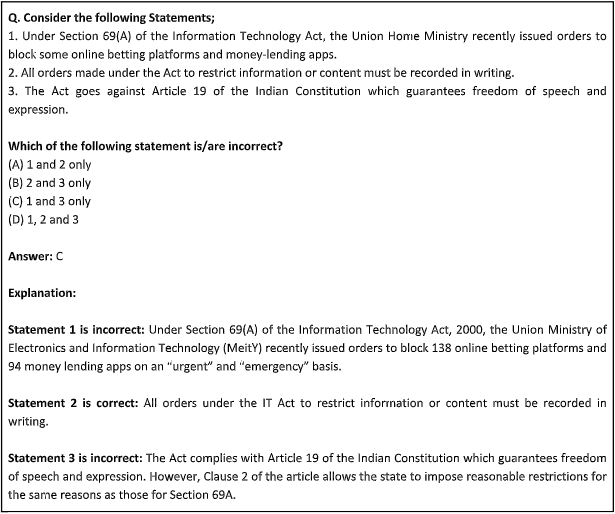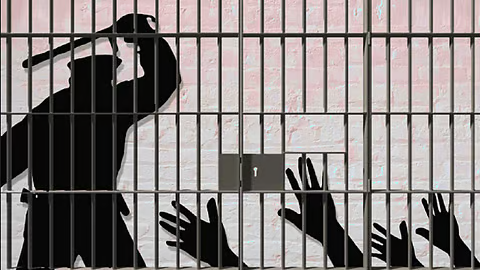Description
_OF_IT_ACT.png)
Copyright infringement not intended
In News:
- Under Section 69(A) of the Information Technology Act, 2000, the Union Ministry of Electronics and Information Technology (MeitY) recently issued orders to block 138 online betting platforms and 94 money lending apps on an “urgent” and “emergency” basis.
- The decision to block these platforms was based on a recommendation of the Ministry of Home Affairs (MHA), which had received inputs from central intelligence agencies that some of the sites and apps were allegedly linked to China and contained “material prejudicial to the sovereignty and integrity of India”.
- Several police complaints have been received of extortion and harassment from people who borrowed small amounts through such money-lending apps.
- For example- The Cyber Police Station of Pune received 699 complaints of loan app crimes in 2020. The number increased to 928 in 2021.
.jpeg)
Section 69A of the IT Act 2000:
- Section 69A of the Information Technology (IT) Act empowers the government to restrict access to any online content to protect the interest of;
- Sovereignty and Integrity of the Nation.
- Security of the State.
- Friendly relations with foreign states.
- Public order.
- All orders to restrict information or content must be recorded in writing.
- Social media intermediaries failing to comply with the rules and regulations are liable to be monetarily penalized along with an imprisonment term which may extend up to 7 years.
- The procedures for executing the provisions of the act are mentioned in the Information Technology (Procedure and Safeguards for Blocking for Access of Information by Public) Rules, 2009.
- Step 1: It mentioned that an officer along with an examination committee reviews the content in question within 48 hours of receiving the takedown request.
- Step 2: Provide an opportunity to the author or originator of the content for clarification.
- Step 3: The recommendations are then sent to the Secretary of the Dept of Information Technology for approval and then a request is forwarded to the social media intermediary for restricting access.
- Emergency provisions specify that clarification is required within 48 hours after the content has been blocked for specified reasons.
- Blocking Orders can be revoked after review or examination.
- Rule 16 of the act states that strict confidentiality should be maintained on all requests and actions taken, but without compromising transparency and accountability.
- The Act complies with Article 19 of the Indian Constitution which guarantees freedom of speech and expression. However, Clause 2 of the article allows the state to impose reasonable restrictions for the same reasons as those for Section 69A.
Concern:
- The Confidentiality Clause under the act is preventing legal challenges to content-blocking orders; it is difficult to understand the Government's reasoning.
- It doesn't come under the purview of the Right to Information (RTI), recently Bharat Sanchar Nigam Limited (BSNL) rejected many RTI requests that asked for the list of blocked websites.
- The lack of transparency, Clear guidelines and a monitoring mechanism under the act means that there are various forms of arbitrary behaviour involved.
- The concerns are raised mainly when the orders are aimed at blocking individual accounts and not the specific content.

Way Forward:
- The Supreme Court in the Superintendent, Central Prison, Fatehgarh vs Ram Manohar Lohia (1960) case has stated that restrictions made in the public interest must include a reasonable connection with the purpose being achieved.
- In Shreya Singhal vs Union of India (2012) the Supreme Court stated a mandatory hearing for the author of the content as well as the intermediary. It is also guaranteed under Rule 8 of the act.
- India needs clarity about the rationality behind limitations and restrictions of free speech which may also guide legislative drafting and judicial decisions in the future.
- We need to balance the National security concerns and the Fundamental Rights of our Citizens.


https://indianexpress.com/article/explained/explained-law/centre-blocks-online-platforms-section-69a-it-act-debate-explained-8434750/




_OF_IT_ACT.png)
_OF_IT_ACT.png)










